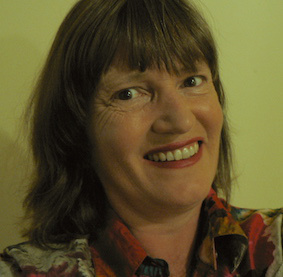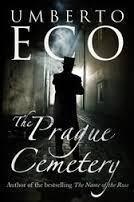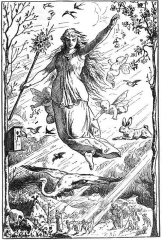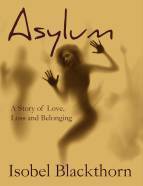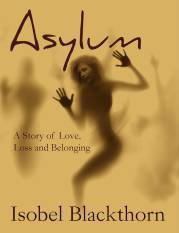Isobel Blackthorn's Blog, page 43
March 9, 2015
Interview With…. Isobel Blackthorn
My very first online author interview!! Many thanks C.A.Milson
 Originally posted on C.A. Milson:
Originally posted on C.A. Milson:
Hi Readers and Booklovers! Today I am talking with Isobel Blackthorn. Isobel was born in London and moved to Aussie when she was 6. Isobel and her family spent around six years in and around Adelaide before they returned to London. Since then, she has travelled a fair bit between the UK and Aussie, and has had the opportunity to live in Spain and the Canary Islands.
Welcome Isobel. Please tell our readers about yourself.
I was born in 1962 in London. My family moved to Australia when I was six. We were ten pound Poms and we lived in and around Adelaide for about six years, before returning to London. I���ve been back and forth between the two countries and I���ve also lived in Spain and Lanzarote, Canary Islands. I���ve been a teacher, market trader, alternative life-styler and PA to a literary agent. I also have a fascination���
View original 1,076 more words
Filed under: Uncategorized

Walking on egg shells
I will never forget the day a big burly man confided in me that his x wife was abusive. He was totally serious. Apparently she used to control him by leaving him notes. Apparently she would ‘flip her lid at the drop of a hat.’ Apparently he was ‘walking on egg shells.’ And worst of all, she was trying to limit access to his kids. She was a nasty, devious, manipulative bitch. I felt sorry for him. For surely he wouldn’t hurt a fly.
Then I met her. She was a tiny, slender woman with a look of shock in her eyes. She was nervous, stressed, haunted. She fretted about window locks and police response times.
Abusive men are the most twisted, underhanded, conning, devious, malicious, controlling arseholes I have ever met and they can be found in every quarter of society. They are so adept at lying and so righteous about it that they will convince even themselves of their absolute virtue.
Couldn’t, possibly, be you.
If you are a man who is using female abuse against male partners to demolish the argument that over 90% of domestic violence is perpetrated by men, then you are revealing only��that��you fear the loss of your domination and are trying to hold on to it��by using female foul play��to undermine the domestic violence argument. Ironically, this use of counter-evidence is��part of the abuser’s toolkit. It blocks discussion on the original ground, subverts the argument and makes it about female abusers and male victims.
I don’t doubt that there are a lot of men (and women) using this strategy��who haven’t thought through the consequences, who are adopting a stance that has become fashionable. There are other ways to engage in a discussion. For example, it is possible to think through the reasons, examples, justifications, assumptions, implications and consequences of a claim on its own ground. None of this is possible if counter-evidence is used for the sole purpose of blocking inquiry.
Filed under: Uncategorized Tagged: abuse, domestic violence, family violence, feminist discourse

March 6, 2015
Humble – the curse of a narcissistic age
I have a HUGE beef with the word, ‘humble,’ and the phenomenon known as, ‘humble-bragging,’ or deploying false modesty in order to boast. It’s ridiculous in our narcissistic age and we ought to be more honest.
I’ll explain my beef with a couple of definitions:
Humble: Having or showing a modest or low estimate of one’s importance.
Humbled: To cause (someone) to feel less important or proud – I was humbled by the experience.
I’ve had this beef for a few years, and��the other��night when David Cameron made some reference to being humbled by something or other, I started to grind my teeth. I have no idea what it was he said because I was stuck on the word, humble.
Recently, journalist Peter Greste made a point of telling the world he was humbled by all the support he received upon his release from an Egyptian prison. He was riding high on his new freedom and his ego at that point would have been the size of China. He was glowing.
What he should have said, which would have been honest, was, I’m grateful. He could have got a bit superlative about it and said, I’m truly grateful. Adding, all the support I’m receiving is overwhelming.
If someone slaps you on the back and says well done mate, (for getting that distinction, that award, that prize, that bit of gold or platinum), you feel proud, you feel important.
If an author receives some praising feedback, she is not humbled by it. She’s ecstatic. She’s bouncing off the walls. She’s doing somersaults and her grin is so broad and fixed it makes her jaw ache. She wants to tell the whole world about it. Hey look! This person over here really likes my stuff! She’s triumphant. All those years of hard work and shaky confidence finally paying off. Above all she is dignified. She holds her head a little higher, thrusts out her chest and enjoys the momentary glory, for that is all it is. And perhaps in her low moments, when she feels as important as a speck of dust, she might, for a boost, re-read that bit of praise and smile.
For the creative life is one of crushing humility. In private, in solitude, every day living with a gnawing uncertainty, not knowing if your abilities can ever measure up to the demands of your imagination, and if your artwork will ever find a place in the world at large. Nothing is more humbling than that.
I am disgusted with a world that demands of its writers��false humility. We shouldn’t have to go about pretending to be humble��when we’re rightly puffed up. It’s pretentious. We all have egos. Even a saint has a ego.
Narcissism is self-love, or an unhealthy preoccupation with ourselves and a consequent disregard for others. In a narcissistic age it is perverse to pretend��to repel, denounce, and fear that which we really covet. Ourselves. It is a lie to deny the dominance of narcissism by censuring those who have every right to be proud for a moment, those who are likely to be the least narcissistic of all of us, those who have every right to bask in honest praise and allow in the dignity it bestows.
And as artists, we should never stoop to humblebragging. We should avoid covertly promoting ourselves and our work by pretending to be humbled by praise.
Just say I’m grateful. Or I’m rapt.
Isobel Blackthorn is the author of the novel Asylum. Her forthcoming novel, The Drago Tree, will be released by Odyssey Books in September 2015.
Filed under: Uncategorized Tagged: David Cameron, Narcissism, Peter Greste

March 4, 2015
I love a good conspiracy
I’ve been dipping into the introduction to a slim book entitled Propaganda by Edward Bernays. It’s the story of a long slow con, the main text written by one of its key proponents, who cites the enormous benefits of propaganda to the politician and the corporation.
The book has me wondering about the rise of shifting shape of propaganda over the last century. I’m no expert but here are a few thoughts.
Many would agree��that Thomas Kuhn, in The Structure of Scientific Revolutions (1962) was spot on in identifying paradigm shifts in science. His insight is so powerful it has been used as a metaphor��with much explanatory power in��history and the social sciences��ever since.
I’m hardly alone in recognising a fairly recent paradigm shift that is affecting the entire world, one rooted in the economics of neoliberalism.
When I was immersed in Umberto Eco’s The Prague Cemetery I kept thinking that the protagonist, Simone Simonini was a typical unscrupulous self-serving totally amoral toad who was happy to do the bidding of various secret services who, in order to accumulate power, were keen to besmirch the Jews and the Freemasons, both groups used as scapegoats.
The events in The Prague Cemetery took place in the latter half of the nineteenth century. Much has changed. Not least a scientific revolution, or paradigm shift in which the new science of Quantum Theory has challenged the old Newtonian physics and a new age of science and technology born. Everyone recognises that.
In contrast the neoliberal paradigm shift is subtle, covert and involves the manipulation of collective thought and emotion. Propaganda is no longer simply about convincing citizens to go to war, or to buy a particular model of washing machine, and it no longer solely serves to promote the various hegemonic ideologies of the day, for example beefing up nationalistic pride.
From Abbott’s “team Australia,” and “death cult” slogans, the overt use of propaganda is screamingly obvious to anyone who paid attention in Year 10 English. These are simply the techniques used by all politicians since 1915, when��governments, “systematically deployed the entire range of modern media to rouse their populations to fanatical assent,” (Propaganda p 11) in the build up to World War I. The��author of the introduction to Propaganda, Mark Crispin Miller, states that propaganda was used before and with success, particularly by Napoleon, but not systematically and it was this systematic use of propaganda that enabled governments to so successfully manipulate their people.
The hidden use of propaganda functions differently. More covert still, it operates far behind the scenes and is obvious only to those who really look. This is the sort of propaganda deployed by the likes of Eco’s Simonini.
When people dismiss conspiracy theory holus bolus as quackery for the paranoid and teenage boys with runaway imaginations, they overlook, as many conspiracy theorists themselves also overlook, that conspiracy is a methodology not a theory. All conspiracy theories are a product of this methodology. Conspiracy, in other words, is a modus operandi, a conspiracy theory generator on the one hand, and much much more besides.
Existing within the thick complex fabric of the world, at work in this country and that, responding to matters arising while seeking to influence those matters, choosing how best to proceed to achieve short and long term goals, employing any shady Simonini to do their bidding, are what might be called the Conspirators. I suppose we can imagine their existence in the inner sanctums of ASIO and embedded in various think tanks and elite groups such as the ��Leo Strausseans.
It could be argued, and with some force, that the vast social, cultural, political and economic web unfolds chaotically, unpredictably, guided by numerous agents who respond to conditions and make decisions, that this vast complex is impossible to control since there are unexpected consequences at every turn.
Yet this very chaotic complexity has opened up new opportunities for a certain kind of navigation, in part involving the manipulation of dissent. It’s as if Simonini’s ilk have stumbled on a smoke screen generator, one so persuasive and deceptive it can be used at will to both burn up the energies of dissenters and deflect the attention of the populace from unpalatable, if or when scrutinised, policies. Toxic policies that are neatly packaged in spin so as to appear entirely virtuous.
Diversion tactics are hardly new. Nothing these Simonini people do is new. What is new is that in Simonini’s day such types operated on behalf of one nation’s secret service or another, to serve various geopolitical ends and to enhance the power of one country over another, or one group, such as the Catholic Church.
Today, in a globalised world where it can be easily argued that 147 corporations run (or rule) the world, geopolitics itself is a smoke screen. All social unrest, including war and terrorism, and the consequences of war – refugees and asylum seekers, are smoke screens. Anything that occurs and is reported on in the media and seems terribly important at the time, is part of the��haze.
This haze is cognitively toxic. For those who do not recognise the toxicity, the damage is invisible. For those who enter the haze with values and beliefs that are counter to it, who contest the injustices, the haze might be��deadly.
Today, for humanity, there can be only one fundamental reality and everything is in service to it. Profit. The social or common good is long gone. We have passed the tipping point and entered a��new age of the corporation and all that remains is the tying up of a few structural loose ends.
The new paradigm is one in which the Conspirators have taken centre stage in a dark theatre thick with haze, haze so dense spotlights create mirrors. We have entered an age in which, as many of us are saying,��1984 and The Castle are being used as instruction guides, and��heinous acts are choreographed, ��everyone is watched and our leader’s read from��double speak scripts.
An age in which in Australia a joker card (Abbott) is played with a straight face that makes the progressives among us rise up alarmed that we are sliding backwards into gross societal unfairness.
Welcome to the age of the Conspirator, the conman and��the adept. A new age��of narcissism and happy pills.��An age of spells and labyrinths and trickery.
An age where mental health equals fantasy. An age ruled by giants who look down, foot poised, on a colony of sugar ants. An age in which defecation is used as syrup to further corrupt our souls.
Filed under: Uncategorized Tagged: Conspiracy theory, dystopia, empire, globalisation, neoliberalism, New Age, Propaganda, Thomas Kuhn, Umberto Eco

March 3, 2015
The horror inside
I’m new to horror. I’m easily spooked and disturbing scenes in movies can haunt me for decades, the flashbacks as real to me as if they were my own. I can still recall moments in Rosemary’s Baby and The Omen, and The Strangers has to be the scariest movie I’ve ever seen. Pretty tame, I know.
 So it puzzles me why I find writing macabre scenes that are narrated by twisted and perverse characters so easy. Maybe the time of day is a factor. I do my best writing before sunrise. I’m up every day between four and five. I make a huge strong coffee and sit in the stillness. No distractions, just me and my pen.
So it puzzles me why I find writing macabre scenes that are narrated by twisted and perverse characters so easy. Maybe the time of day is a factor. I do my best writing before sunrise. I’m up every day between four and five. I make a huge strong coffee and sit in the stillness. No distractions, just me and my pen.
Maybe it’s because I’m in control and therefore there are no surprises. But if, when I’m writing a scene, I can make myself laugh so much I’m rolling on the carpet, then I’m just as capable of spooking myself.
I’ve been told that writing psychological horror can be purging or cathartic, releasing the inner demons. Which would mean I have an inner psychopath or two lurking in my depths. Not true. I prefer to think I’m tapping into the collective unconscious. Or drawing on psychos I have known.
Then again, how many of us can say with confidence that we��are aware of every dusty corner of our psyche? Perversity breeds perversity, like a virus, and just because you suppress or deny it, doesn’t mean it isn’t there. We are all corrupt, all in denial, all capable of cruel acts.
When my cat Psyche was a kitten, I stroked her and she rolled on her belly, little paws in the air, her gaze fixed on mine. And my hand circled her neck and I knew that all I had to do was squeeze and she’d be dead. It was that easy. I��paused, felt the power rise, an ultimate sort of power, and I knew that there was not much space between realising the potential and committing the act.
Most of us have a stronger moral self, a conscience, that stops us from doing macabre things. I didn’t strangle my cat. I was disturbed it even occurred to me that I could.
My latest novel is shaping up to be more about the banal nature of perversity than it is edge of seat terror. It is more like the movie, Sightseers, or Peter Carey’s The Tax Inspector, than anything by Stephen King. I’ll be relieved when it’s written and I can move on to something else. It isn’t pleasant to dwell in such dark terrain. I’m becoming distant from the world around me, mistrustful, suspicious, on guard. And as for the things��I’m discovering in my imagination,��they’re unspeakable.
Filed under: Uncategorized Tagged: contemporary fiction, fiction, horror, novel, psychopaths, Rosemary's Baby, Stephen King, The Omen, The Strangers

February 26, 2015
The Prague Cemetery – a belated review
The number of authors fascinated by metaphysics and the supernatural never ceases to make me wonder about the relationship between the creative psyche and that��vast realm of��the imagination.
There are those who immerse themselves in mythical and symbolic riches and create complex fantasy landscapes. I’m not a huge reader of fantasy and can only mention Ursula le Guin’s The Earthsea Trilogy, which I have read and thought amazing.
Others tackle the��metaphysical side of reality in more direct ways, taking journeys into the supernatural and occult. Bram Stoker’s Dracula seems a good early example.
There are the magical realists from Jorge Luis Borges on, who include the paranormal in their stories as if it were a given. Isabel Allende’s The House of the Spirits is just one example.
Then there are those who embed��their insights to give shape to themes. I think of how��Doris Lessing’s interest in Sufism��inspired her Canopus in Argos Archives.
And it seems that down the ages many writers, along with artists, composers and scientists have had more than a passing interest in the occult. I found a list on a website of Rosicrucians and was astonished to find Bram Stoker, Isaac Newton, Victor Hugo, Yeats, Satie, Edith Piaf and Walt Disney on the list, along with more obvious suspects, such as Jacob Boehme and Francis Bacon. I have no idea how accurate the list is or how immersed in Rosicrucianism each person listed may have been.
I do know a fair bit about the occult though, or western esotericism as it is more properly called.��Which is why I found Umberto Eco’s The Prague Cemetery such a compelling read.
The Prague Cemetery might seem at first like a cook’s tour of the upheavals and power struggles of Europe at the time, written from the perspective of a fierce anti-semite.��The basic plot is very simple, the reader uncertain as to whether the protagonist, the repugnant Simonini, has a split personality.
Following Freud’s thinking��on the matter, Simonini, who seems to have no idea himself,��decides to write a diary to find out. What ensues is a journey through the latter part of he nineteenth century, as Simonini, a master forger of documents, becomes immersed in a web of lies, misinformation,��and elaborate inventions of truth designed to discredit the Freemasons and the Jews. Simonini is an unscrupulous psychopath, who works for the secret service of first Italy, then France. What is remarkable is that every other character in The Prague Cemetery��existed in reality and all the historical events and those involved are verifiable.
While much has been made of Eco’s fictional depiction of the notorious��The Protocols of the Elders of Zion, a complete invention that inspired Hitler decades later, in my view a subtler and more general point is being made.
That behind the scenes of history there are those hard at work creating one conspiracy theory after another, whether in fiction or as apparent fact, in other words conspiring to accuse others of a��conspiracy in order to fulfil their own agenda, an agenda as simple as personal greed.
I salute the author for hammering this point. For it is my contention that the ultimate coup of the propagandists today is the discrediting of the very conspiracy theories they themselves have created in order to cement in the zeitgeist the view that all conspiracy thinking is��rubbish, thus��allowing them a huge freedom to continue to conspire.
Umberto Eco’s interest in western esotericism is well known. Through his fiction he explores this world within the world while keeping himself distant from it. An observer, not a practitioner. A thinker who questions and probes, not an adherent who adopts without question. It is this distance that allows him to write works like The Prague Cemetery.
Filed under: Uncategorized Tagged: Conspiracy theory, Rosicrucians, The Prague Cemetery, The Protocols of the Elders of Zion, Umberto Eco, Western Esotericism

February 24, 2015
Islam and the terror mongers
I used to teach Religious Studies at a high school in the UK. Best subject ever, from trawling through world faiths in the lower years, getting hot under the collar following the GCSE curriculum where moral issues such as Wealth and Poverty were explored, all the way to A Level, when it morphed into Philosophy of Religion.
I was teaching in 2001. The day the twin towers fell I’d just come out of a class on Islam. I was teaching Islam to four classes of Year Eights at the time.
In those classes we explored some core beliefs such as the five pillars of Islam. We did a historical cook’s tour and we thought about what we as white non-believers could learn from the faith.
Bang! A light bulb switched off.
It was the day the Dark Age began.
I’m not getting into the whodunnit side of things. All I know is the pudding was already cooked and ready to serve.
Bang!
Welcome to the era of the terror monger.
Before the dust had settled on the towers, ‘war or terror’ and ‘axis of evil’ were rolled out. War in Afghanistan and then, to the horror of the world at large, the invasion of Iraq. A sorry recent history full of bloodshed and fomenting hatreds.
Our New Dark Age has the stamp of terror all over it. A stamp of indelible ink wielded on soft skin by the anti-terrorists.
The New Dark Age is an age of Security and Surveillance.
The hordes of bloodthirsty nutters with guns are doing nothing but serving this agenda. I wish they could see their own complicity. I wish they could see that they are empowering the very beast they fight.
As for the rest of us, while we sit around hoping we don’t get caught in the crossfire, we’re already ensnared. Our freedoms constricted by a raft of new laws. Our journalists gagged.
Islam is a fine faith and I, as a non-believer, will always defend it. Islam teaches that within each of us is a divine spark, something pure and sacred and connected to God.
My wish is for that spark to flame and light this darkening world, light up the hearts of those consumed by hatred.
And��as for the greedy who are behind everything that is wrong with this world, I have yet to figure out what’s to be done about them…
Filed under: Uncategorized Tagged: 9/11, American empire, Dark Age, dystopia, empire, Five Pillars of Islam, globalisation, Islam, nature of humanity, neoliberalism, Power, Security laws, surveillance, Terrorism, terrorist, Twin towers, war

Writing horror is not for the faint-hearted!
I’m about 20,000 words into my latest novel and it’s giving me the creeps. I now know why many horror writers choose��the short story form. What extraordinarily resilient constitutions authors like Edgar Allen Poe and H P Lovecraft must have had!
For months and months I have to live inside the fictional reality I’ve created and I’m not sure what it’s doing to my psyche.
And things just keep getting worse. My inner scribe is have a devilish ball throwing up all kinds of disturbing twists and there are days when I feel like putting a very large distance between me and her.
I’ve known for some years that she’s a bit wild. I’ve found it best to give her free reign of any new literary landscape and come along afterwards with my editorial eye.
Only this time I’m finding she needs restraining while I assimilate her latest missive.
Thank heaven’s my cat Psyche is white. Otherwise, I’m sure I’d feel a jolt every time she crossed my path.
Filed under: Uncategorized Tagged: Edgar Allen Poe, fiction, H P Lovecraft, horror, storyteller

February 23, 2015
Asylum giveaway to the 600th fb Liker!!
The chainsaw is still at it next door which means today I can’t write another thing. Luckily I woke at 4.30 am and did most of the day’s scribing before sunrise. Those hours are truly special.
So rather than just sit here, idle, I thought I’d give away a copy of Asylum (either epub or Kindle) to my 600th facebook page liker. My page is currently standing at 559 likes.
To win this freebie click here. And good luck!!
Filed under: Uncategorized Tagged: asylum, book giveaway, free book

Asylum – the story behind the story
Asylum is my first novel. It began life as��a story with a number of enticing elements bound together in truth. Like protagonist Yvette Grimm, I was an English-born visa overstayer and I really did invest my hopes in a palm reader���s prophecy that I would meet the father of my children before I was thirty!
In about six months I produced a first draft. I was pleased��with the achievement, producing 80,000 words of fiction is no easy thing, yet the��story��seemed to meander on, reaching a conclusion that felt flat. So I set aside the draft, reasonably happy never to look at it again.
Yet the title��nagged me. ���Asylum,��� with its double meaning, seemed well worth exploring, but how?
Months later a friend and blogger, Colin Penter, ��posted on facebook a link to a book. It was Profits of Doom by Antony Loewenstein. I borrowed a copy from the library and read it from cover to cover in two days. Profits of Doom led me to explore the plight of asylum seekers and I soon found a plethora of online commentary, and much activism around the country. I began to wonder how I could contribute.
It was a gnawing sense of injustice that caused me to return to that draft of Asylum. I axed over half the text, ripping into the narrative scene upon scene until the barest bones were left. I set about making visa overstayer Yvette Grimm an artist because I wanted her to be as different from me as possible and I can only paint walls. I managed to work Profits of Doom into a scene. Things were progressing well but towards the end the narrative still lacked intensity.
That was when a friend, Georgia Matthey, came round for dinner and after I had outlined how things were in the fictional land of��Asylum, she began to describe a recent event in her life. Seeing the potential straight away, I grabbed paper and pen and wrote down her vignette and with her permission used it to shape the climax of Asylum.
I could now call Asylum��a manuscript and I needed a reader. I was thrilled when writer, feminist and activist Jasmina Brankovich��put up her hand. I had to wait weeks for her feedback and when she told me she loved it I knew I could publish with some confidence.
At first I serialised the story in weekly parts on my blog but demand grew for a whole book, so I took the indie path and with the help of Cohesion Press��converted��Asylum��into epub and Kindle editions.
Asylum��explores��the theme of seeking asylum, Yvette juxtaposing her experiences with those of asylum seekers being held in detention. It is my sincerest wish that Asylum��both entertains and contributes to the larger dialogue on the treatment of asylum seekers in Australia.
You can read my non-fiction writing on asylum seekers in On Line Opinion��or here on my blog.
Filed under: Uncategorized Tagged: antony loewenstein, asylum, asylum seekers, boat people, contemporary fiction, fiction, illegals, literary fiction, profits of doom, refugees, women's fiction



